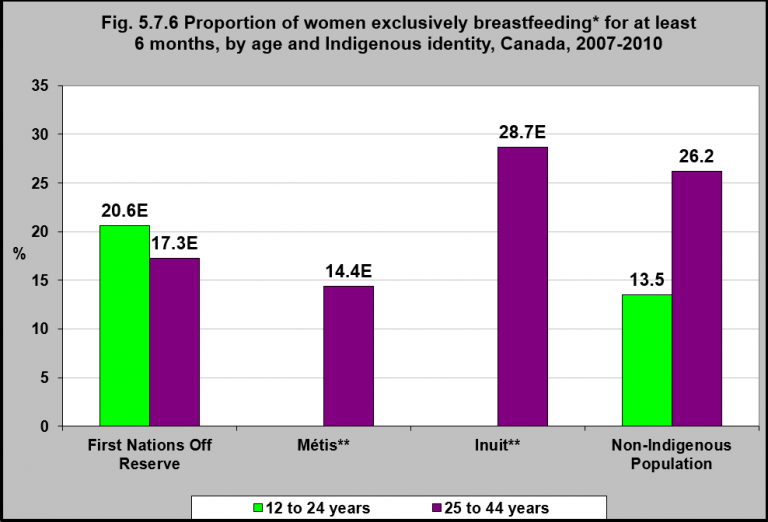Proportion of women exclusively breastfeeding for at least 6 months, by age and Indigenous identity, Canada, 2007-2010

Notes:
E – Use with caution
*Exclusive breastfeeding refers to an infant receiving only breast milk, without any additional liquid (even water) or solid food.
**12 to 24 age group too unreliable to publish
Source: CICH graphic created using data adapted from Statistics Canada. Table 105-0512 – Health indicator profile, by Aboriginal identity, age group and sex, four year estimates, Canada, provinces and territories, occasional (rate). http://www5.statcan.gc.ca/cansim/a05?lang=eng&id=1050512 -accessed August 10, 2017.
In 2007-2010, 21% of 15 to 24 year old First Nations women living off reserve who had given birth in the previous 5 years breastfed exclusively for at least six months. That was the case for 14% of non-Indigenous women. (The numbers for Métis women and Inuit women are two small to report).
Among First Nations women 25 to 44 years of age living off reserve who had given birth in the previous 5 years, 17% exclusively breastfed for at least 6 months.
Among Métis women, 14% of those who gave birth in the previous 5 years breastfed exclusively for at least six months, as did 29% of Inuit women and 26% of non-Indigenous women.
Implications
A small proportion of women are exclusively breastfeeding for the first 6 months consistent with the recommendations of Health Canada and its partners. While Indigenous communities have had a “long history of support for breastfeeding mothers and their families,”1 there may be a number of unique barriers and challenges to sustained breastfeeding among Indigenous women and culturally-relevant approaches to addressing these barriers and challenges are needed to facilitate supportive environments for breastfeeding in Indigenous communities.
1Public Health Agency of Canada. (2014). Protecting, promoting and supporting breastfeeding: A practical workbook for community-based programs. Ottawa, ON: p. 24.
